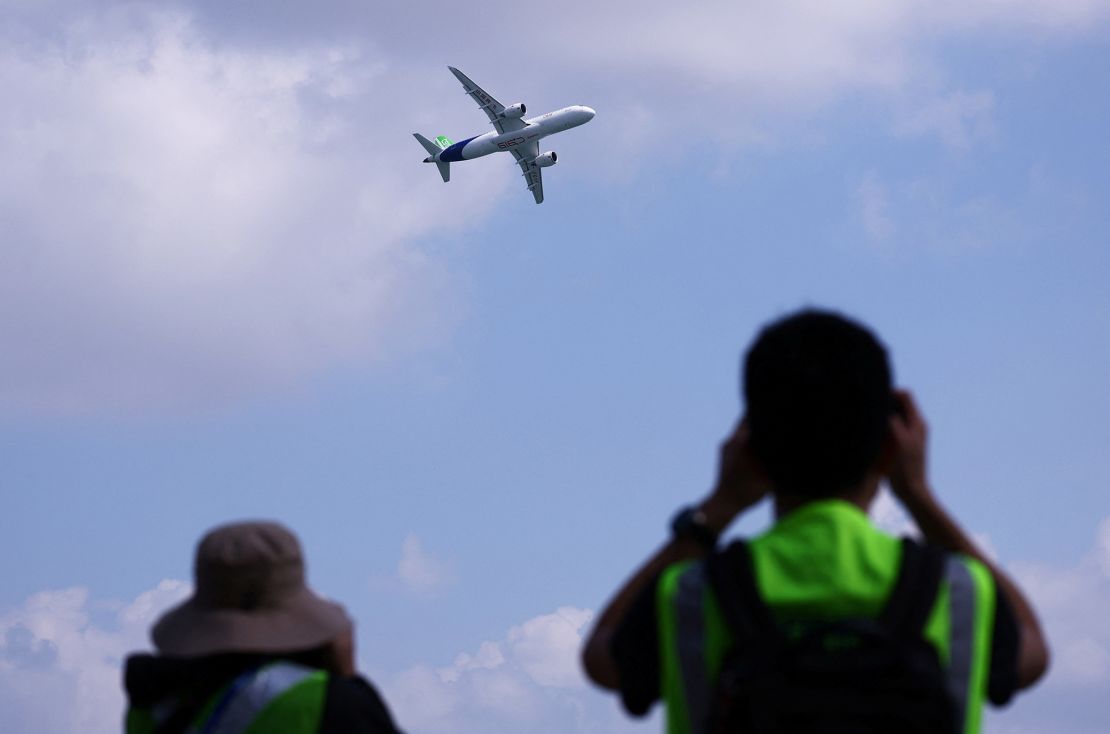Beijing’s C919 airliner, a potential rival to Western-made Boeing and Airbus planes, made its first foray outside Chinese territory on Sunday by staging a flyby at the Singapore Airshow.
The single-aisle jet, manufactured by the state-owned Commercial Aircraft Corporation of China (Comac), is a prominent symbol?of Beijing’s broader?“Made in China” strategy, which aims to reduce reliance on foreign manufacturers.
China calls the C919, which can carry just under 200 passengers,?its first large homegrown passenger jet. The aircraft took to the skies for its first commercial flight last May. It s certified to carry passengers only within mainland China and flies with China Eastern Airlines.
This is “the first time we will be having exhibitors from China,” Cindy Koh, executive vice-president of Singapore’s Economic Development Board, one of the airshow’s organizers, told reporters Sunday.
At the show, which started officially on Tuesday, China’s state-owned Tibet Airlines announced an order for 40 C919 jets, plus 10 of the smaller ARJ21 regional jets that Comac also makes, according to Chinese state media Global Times.
China has made no secret of its ambition to eventually compete against Boeing (BA) and Airbus (ABNB). The C919’s overseas debut comes at a time when Boeing is making headlines for all the wrong reasons. Last month, part of the fuselage of a 737 Max 9 Boeing plane fell off during an Air Alaska flight in the United States.
Shukor Yusof, founder of Endau Analytics, a firm that tracks the aviation industry, said the C919 would be “the most scrutinized aircraft at the Singapore Airshow,” an event that draws company executives?and high-ranking government officials from around the world.
“There is a lot of interest to see the actual aircraft, how it performs and how it is in flight,” he said.

Currently, only a handful of countries make their own planes because of extremely high barriers to entry in the industry. A high level of technical expertise, as well as huge amounts of time and resources, is needed.
The C919, for instance, has cost its backer an estimated $49 billion in development, manufacturing and other costs,?according to the Center for Strategic and International Studies in Washington, though it says pinning down precisely how much is a tough task because Comac’s finances are opaque.
In December, it conducted a demonstration flight in Hong Kong’s Victoria Harbour, in its first voyage outside mainland China.
Yusof said rising tensions between Beijing and Washington would also make it difficult for Comac to find a market in the West.
“You can’t run away (from) all the politics with China and the rest of the world, and that sigma is going to stick with them for quite a while,” he said.
The model has not yet been certified by American and European aviation regulators, which Yusof said was “a big disadvantage.”
With capacity to fly between five to six hours, the C919 is perfect for regional travel, he added, saying it had the potential to appeal to countries in Southeast Asia, Africa and Central Asia, which are politically more friendly to China.
“It will become a competitor in a small way, but it won’t be in the same league as Airbus and Boeing,” he said.
Last year, Indonesian low-cost airline TransNusa became Comac’s first overseas customer, snapping up its ARJ21, which can carry just under 100 passengers.





